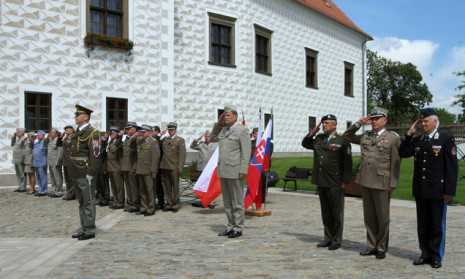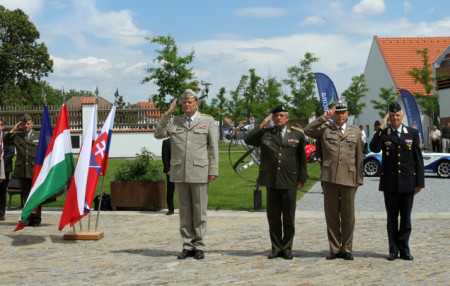V4 Chiefs of Defence Hold Discussions in the Czech Republic
Szöveg: General Staff | 2016. június 11. 6:53The annual meeting of the countries of the Visegrád Cooperation at Chiefs of Defence level took place in Namest nad Oslavou, the Czech Republic on 8th–9th June 2016.
On the first day of the discussions, the participants took stock of last year’s results achieved under the Czech presidency and were given an insight into the planned main tasks and ideas of the Polish presidency. The Polish Chief of Defence pointed out that the regional cooperation of the Visegrád Four countries has significantly grown in importance over the last period, when the region and the whole of Europe faced challenges that have redrawn the security policy map of Europe in a few weeks. The V4 Chiefs of Defence agreed that currently the main challenges to Europe are the crisis in Eastern Ukraine, cyber attacks and illegal mass migration, which they called a serious threat.

Placed on stand-by since 1st January, the V4 EU Battle Group (V4 EUBG) declared to the European Union is considered to be presently the most tangible result of the ongoing defence cooperation, so its future was high on the agenda of the discussions. At the plenary meeting, the Hungarian delegation gave an overview of the plans prepared by the General Staff for a new V4 EU Battle Group that is scheduled to be on stand-by in 2019.
Coordinating the force development and defence planning of the member states is a highly important field in the Visegrád Cooperation. The participants of the discussions reviewed the current force development projects and worked out a common position in the field of capability development so that the resources allocated to development project can be used more efficiently through mutual assistance.
The member states looked to international aspects of collective regional defence planning, paying special attention to ensuring that their joint efforts are in accordance with the strategic goals of NATO and the EU. In this connection, the military leaders explored the possibility of conducting a series of exercises on a rotational basis in the Baltic countries. This would provide a continuous V4 presence in the region and thereby contribute to the NATO Assurance Measures.

On the second day of the meeting, Hungarian Deputy Chief of Defence Lt.-Gen. Dr. Zoltán Orosz held a bilateral discussion with the invited guest, Ukrainian Chief of Defence and Commander-in-Chief of the Armed Forces of Ukraine Viktor Mikolayovich Muzhenko. At the meeting, the military leaders discussed Hungary’s contribution to the NATO–Ukraine cooperation and the military-to-military relations.
At the end of the conference, the Chiefs of Defence of the V4 countries issued a final joint declaration in which they reaffirm their commitment to the ongoing cooperation. The document has been produced with the stated intention of enabling the Visegrád countries to speak with one voice and make joint efforts in contributing to the long-term goals of NATO and the EU, which promote security and stability in the region.
As for the future of the Visegrád Cooperation, the program for next year’s Polish presidency ambitiously identifies the objectives and lists the areas in the proper order of priority, so it is expected to provide an adequate basis for continuing the projects that have been launched under the Czech presidency. To Hungary, it is especially important that the Polish presidency also lays great emphasis on collective defence planning and the coordination of procurements and combined training events by the V4 countries. Approved in this May, the V4 Defence Cooperation Action Plan for the period between 2016–2018 provides an excellent foundation for attaining the above-mentioned goals.
Photo: General Staff